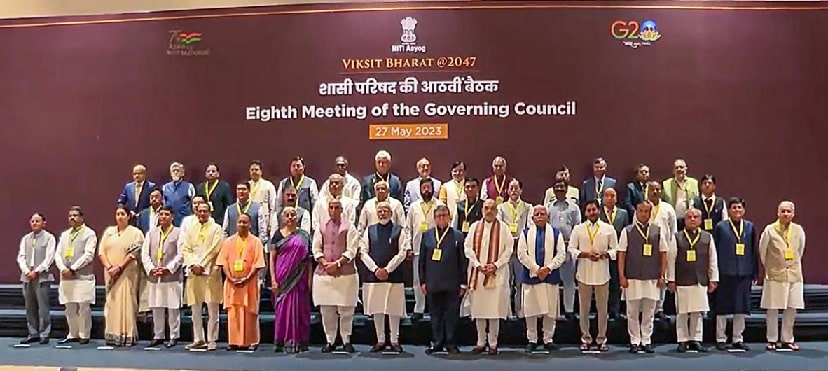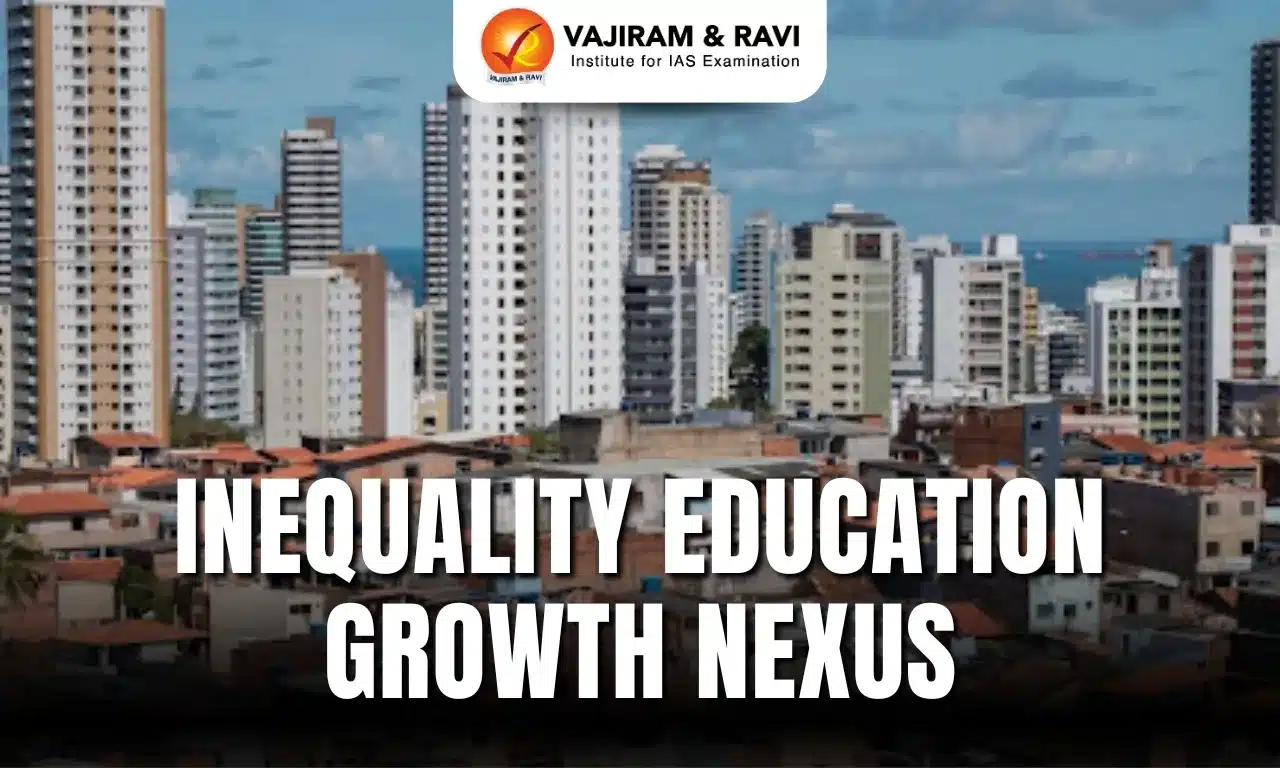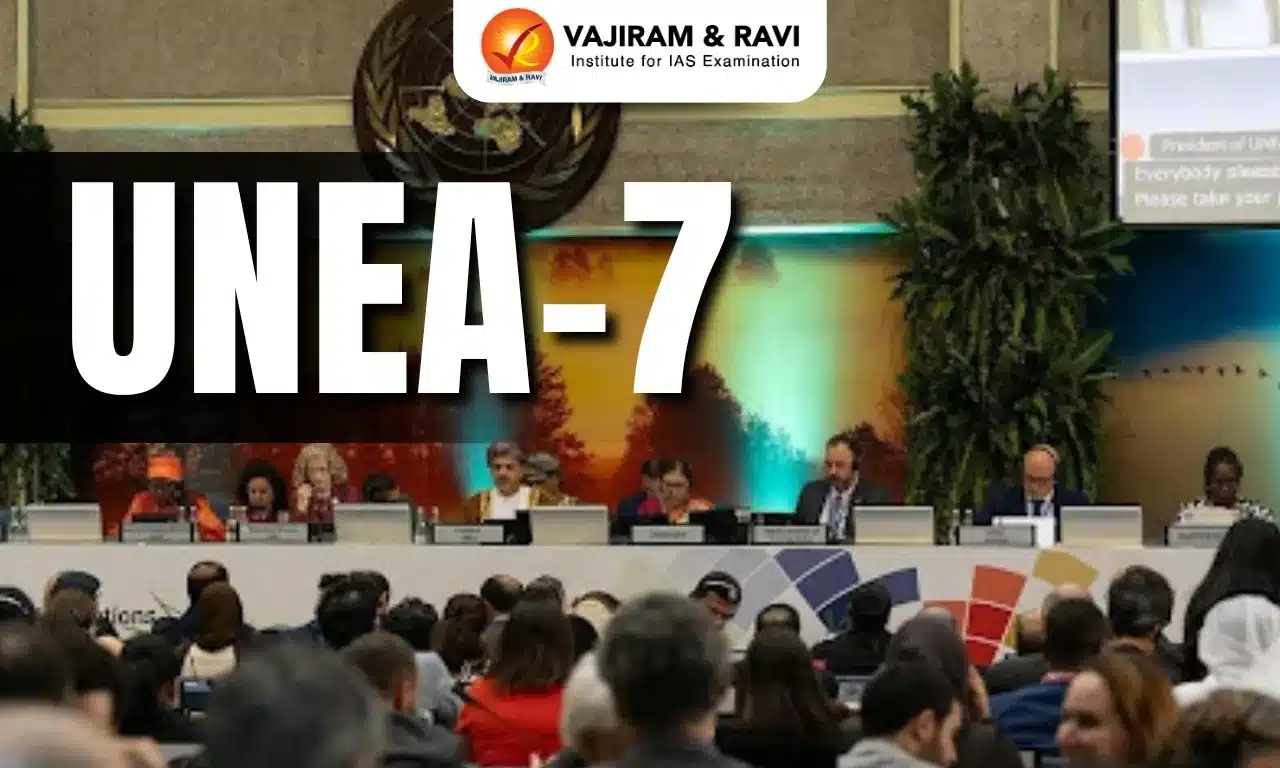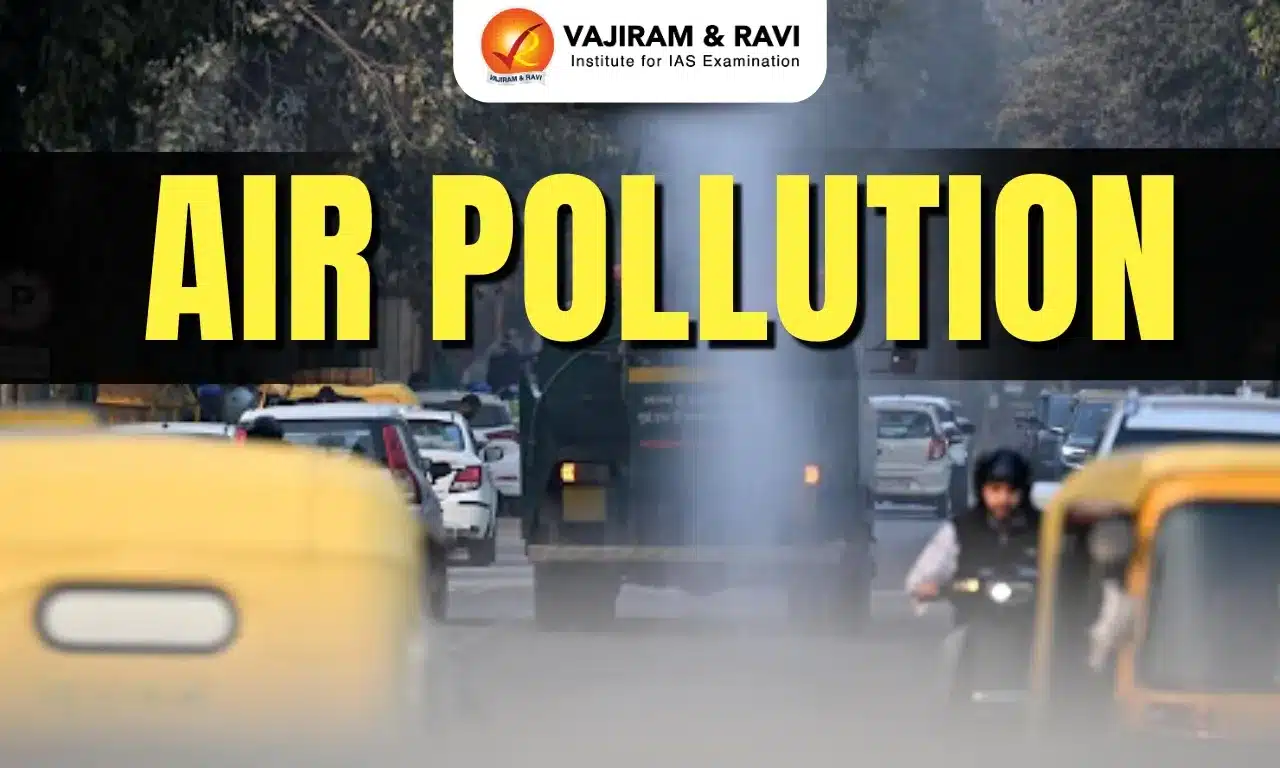What’s in today’s article?
- Why in news?
- What is National Institution for Transforming India (NITI) Aayog?
- What has been the Performance of NITI Aayog?
- NITI Aayog: Promoting Federalism
- News Summary: NITI Aayog’s eighth Governing Council meet
- Key highlights of the speech delivered by PM Modi
Why in news?
- PM Modi chaired the eighth Governing Council Meeting of NITI Aayog. The meeting was conducted at the new Convention Centre in Pragati Maidan, Delhi.
- The theme for this meeting was ‘Viksit Bharat @ 2047: Role of Team India’.
What is National Institution for Transforming India (NITI) Aayog?
- About:
- NITI Aayog, was formed via a resolution of the Union Cabinet on 1 January 2015. It was constituted to replace the Planning Commission – instituted in 1950.
- It is the premier policy think tank of the Government of India, providing directional and policy inputs.
- NITI Aayog acts as a platform to bring the States to act together in national interest and thereby fosters cooperative federalism.
- Composition
- Chairperson: The Prime Minister of India
- Full time organisational framework:
- Vice Chairperson: Appointed by the PM, s/he enjoys the rank of a Cabinet Minister.
- Full-Time Members: Enjoys the rank of a Minister of State.
- Part-Time Members: Maximum 2.
- Ex-Officio Members: Maximum of 4 members of the Union Council of Minister to be nominated by the PM.
- Chief Executive Officer (CEO): Appointed by the PM for a fixed tenure, s/he enjoys the rank of Secretary to the Government of India.
- Special Invitees: These will be experts with relevant domain knowledge to be nominated by the PM.
- Governing Council of NITI Aayog:
- The council is the premier body tasked with evolving a shared vision of national priorities and strategies, with the active involvement of States.
- It presents a platform to discuss inter-sectoral, inter-departmental and federal issues to accelerate the implementation of the national development agenda.
- Composition of Governing Council:
- It is chaired by the PM and comprises Chief Ministers of all the States and UTs with legislatures and Lt Governors of other Union Territories.
- The council also comprises of Vice Chairman, NITI Aayog; Full-Time Members, NITI Aayog; and Special Invitees.
- Before 2023, seven meetings of the Governing Council had been held (7th meeting was held on August 7, 2022).
What has been the Performance of NITI Aayog?
- As an action Tank: By collecting fresh and new ideas and sharing them with the government at the Central and State level, it ensures that there is no inactivity in any organisation or institution.
- Improving innovation: A commendable work has been done by the Atal Innovation Mission (established under NITI Aayog), which has helped in improving the innovation ecosystem in India.
- Bringing greater responsibility in the system: Development Monitoring and Evaluation Office (DMEO) has been established by the NITI Aayog, which collects performance data of various Ministries on a real-time basis.
- These data are then used at the highest policy-making levels to improve performance and establish accountability.
- Some important initiatives of NITI Aayog: Some of the initiatives like Ayushman Bharat, water conservation measures, approach towards artificial intelligence, have been conceptualised in NITI Aayog and respective Ministries are taking them forward.
- POSHAAN ABHIYAAN by NITI Aayog is cutting across the silos within the government and helping in reducing malnourished children in India.
NITI Aayog: Promoting Federalism
- Cooperative Federalism
- NITI has provided a platform for direct issue-based interaction between States and Central Ministries thereby helping quick resolution of outstanding issues.
- The NITI Forum for North East has been constituted and tangible sectoral proposals are being implemented by the States in partnership with the North East council.
- NITI has designed some major initiatives for island development which are being implemented under the overall guidance of the Ministry of Home Affairs.
- It is also envisaged that like the NITI Forum for the North East, other regional councils of contiguous States could be formed.
- The first step has been taken by forming the Himalayan States Regional Council and forming a coalition of all thirteen central universities in these states.
- Competitive Federalism
- It promotes competitive federalism principally through pushing its sectoral indices which are put out in the public domain.
- The indices on water, education, health, innovation, export preparedness, and Sustainable Development Goals (SDGs) have attracted significant positive attention.
- It has also introduced a competition element in ‘Aspirational Districts Program’ by focusing on governance improvement on the ground.
- These districts have shown significant improvement in indicators pertaining to health and nutrition, education etc.
- Besides, several best practices in governance have emerged from these districts which are now being scaled up and replicated at the block level in some states.
- It promotes competitive federalism principally through pushing its sectoral indices which are put out in the public domain.
News Summary: NITI Aayog’s eighth Governing Council meet
Key highlights of the speech delivered by PM Modi
- To achieve the goal of Vikasit Bharat by 2047
- PM Modi asked the states and districts to develop a long-term vision to make India a developed country by 2047.
- In this context, he said it was essential to combine the vision of states and districts with the national vision to reach the goal of Vikasit Bharat by 2047.
- Urged the states to take financially prudent decisions
- He also urged the states to take financially prudent decisions which would make them fiscally strong and capable of undertaking programmes for the welfare of citizens.
- Urged the States to proactively use the Gati Shakti Portal
- He urged the States to proactively use the Gati Shakti Portal not only for infrastructure and logistics but also for local area development and creation of social infrastructure.
- PM Gati Shakti – National Master Plan for Multi-modal Connectivity, is essentially a digital platform to bring 16 Ministries together for integrated planning and coordinated implementation of infrastructure connectivity projects.
Q1) What is federalism?
Federalism is a political system that involves the division of power between a central government and multiple regional or state governments. It is characterized by the sharing of authority and sovereignty between different levels of government, allowing for a distribution of powers and responsibilities.
Q2) What is PM Gati Shakti?
PM Gati Shakti – National Master Plan for Multi-modal Connectivity, is essentially a digital platform to bring 16 Ministries together for integrated planning and coordinated implementation of infrastructure connectivity projects.
Source: PM asks states, districts to develop long-term vision to make India developed nation by 2047 | PIB | The Hindu
Last updated on December, 2025
→ Check out the latest UPSC Syllabus 2026 here.
→ Join Vajiram & Ravi’s Interview Guidance Programme for expert help to crack your final UPSC stage.
→ UPSC Mains Result 2025 is now out.
→ UPSC Notification 2026 is scheduled to be released on January 14, 2026.
→ UPSC Calendar 2026 is released on 15th May, 2025.
→ The UPSC Vacancy 2025 were released 1129, out of which 979 were for UPSC CSE and remaining 150 are for UPSC IFoS.
→ UPSC Prelims 2026 will be conducted on 24th May, 2026 & UPSC Mains 2026 will be conducted on 21st August 2026.
→ The UPSC Selection Process is of 3 stages-Prelims, Mains and Interview.
→ UPSC Result 2024 is released with latest UPSC Marksheet 2024. Check Now!
→ UPSC Prelims Result 2025 is out now for the CSE held on 25 May 2025.
→ UPSC Toppers List 2024 is released now. Shakti Dubey is UPSC AIR 1 2024 Topper.
→ UPSC Prelims Question Paper 2025 and Unofficial Prelims Answer Key 2025 are available now.
→ UPSC Mains Question Paper 2025 is out for Essay, GS 1, 2, 3 & GS 4.
→ UPSC Mains Indian Language Question Paper 2025 is now out.
→ UPSC Mains Optional Question Paper 2025 is now out.
→ Also check Best IAS Coaching in Delhi

















